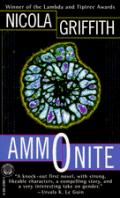
| Publisher: | Del Ray |
| Copyright: | 1992 |
| Printing: | February 1993 |
| ISBN: | 0-345-37891-1 |
| Format: | Mass market |
| Pages: | 349 |
The colony world Jeep is striken by a mysterious virus that kills all of the men and a substantial percentage of the women. Marghe, an anthropologist who works for the incestuous mix of government and corporation running the colonization missions, is given an experimental vaccine and is sent down to both test the vaccine and to try to track down the mystery of the virus and the civilization that thrives on the planet despite it. In the process, she ends up going native, falling in love with the planet and its culture in more ways than one.
This is an excellent book, particularly exceptional for being a first novel. It manages to give the reader a leisurely survey of Jeep and the people who live there without being boring, despite veering quite far from traditional SF elements into stories of wise women and the nature of families. Griffith weaves together a personal quest, a feminist story, several levels of social commentary, a colonization story, and a first contact story of a sort without feeling like she's throwing in too much, and while still taking the time to add deft touches of background to minor characters. It's always a good sign, in a book with two viewpoint characters, that I wanted more of each character when the viewpoint switched to the other.
The closest comparison for Ammonite is The Left Hand of Darkness by Ursula K. Le Guin. While the plot is far from the same, some of the background feeling and a few structural elements are quite similar. This is high praise; I was very impressed by The Left Hand of Darkness, and I enjoyed Ammonite just as much as a story (although Griffith's science is on far shakier ground). Griffith strikes a less nuanced note at the end, and is missing some of Le Guin's polish, but all of her characters felt vivid and real to me.
The hook for Ammonite is the virus that kills all men on the planet of Jeep, and indeed there is only one brief appearance by a male character in the entire book. Having set up that scenario, however, Griffith does not make an overt point of it. This is blessedly not a preachy book, and while there is a distinct difference to the politics and relationships on Jeep, there are still violent people, violent cultures, wars, feuds, and other typical, non-utopian human behavior. The change is far more subtle than that, and secondary to the journey of personal discovery undergone by the two viewpoint characters.
The weakest part of the book, though, is that virus. If you like your SF hard and your plot devices vaguely defendable, the magical mind-altering virus, hand-waving explanations of lesbian pregnancies, and magnetic field voodoo are going to drive you nuts. None of this is really science; it's pure plot device to set up the situations and experiences that Griffith wants to explore. It's best to go into this story expecting mystical things to happen and not worrying too much about the explanations, since the book really isn't about the pseudo-science. It's about personal discovery, about the growth of relationships, about how one can get trapped in a particular outlook and how sometimes one can break free again, and about how much fun it is to be outside during a lightning storm.
If you insist on hard science, best to avoid this one, but otherwise, I recommend it highly, particularly to people who liked Le Guin. A solid character-driven story. I'm looking forward to reading Slow River.
Reviewed: 2005-06-04